To say that something is the most [fill in the blank] thing of all time is rather presumptuous. We say that the games on the list below are among the most essential and/or influential of all time, but really, we couldn’t be bothered to research what GBA game Columbus took along on his long sea voyage to America, or what game the ancient Mayans were thinking of 1,500 years ago when they (supposedly) predicted the world would end in 2012 with the release of the Wii U. No, when we say of all time, we really mean of our lives (or possibly, “as far as we can tell”), for these are the games that defined genres, lifted our spirits in times of need, taught us the DOs and DON’Ts of combining friends and firearms, ruined our chances of scoring a date to the prom with Prissy Pendergrass, and confused our perceptions of reality with characters of ambiguous gender.
In the first installment, we covered games whose titles start with the letters A-D. Take a moment to get caught up if you’d like, but you’d better make it snappy—the alphabet waits for no man, and once it reaches the letter E, there’s no stopping it from going straight through to K.
EarthBound (SNES) – Christian Porter
Turn-based JRPGs have been my favorite genre since Final Fantasy IV (see below), but around the early-to-mid-nineties I was already growing tired of the JRPG stereotypes and would often seek refuge from the same old effeminate flying boat pilots by delving into the world of adventure games—the comedic Maniac Mansion and Simon the Sorcerer being my favorites of the time.
I loved these games, but wished some of this humor could find its way into the RPG genre as well.
Soon after, EarthBound was released as the direct answer to my wishes. It broke stale RPG conventions and revitalized my love for the genre. On top of this, it gave me a new favorite game and a mild obsession: my AIM screen name at the time was MrSaturn (and some numbers I forgot); I have on several occasions almost gotten an EarthBound tattoo (until I remember that requires a needle to touch me); and I even briefly was an amateur wrestler, a lovably demented guy named Lord Saturn that often spoke nonsense smack talk like “I’m going to galvanize you like the nail that you are!”, in much the same way Mr. Saturns in EarthBound would speak incoherent nonsense. (Unbeknownst to me, it turns out an actual professional wrestler at the time was also doing a comically demented bit. His name? Perry Saturn. Oops.) So, if I seem to mention EarthBound a lot, it’s because I’ve had a bit of an obsession with it for nearly the past two decades.
Elder Scrolls V: Skyrim (X360) – Kate Jay
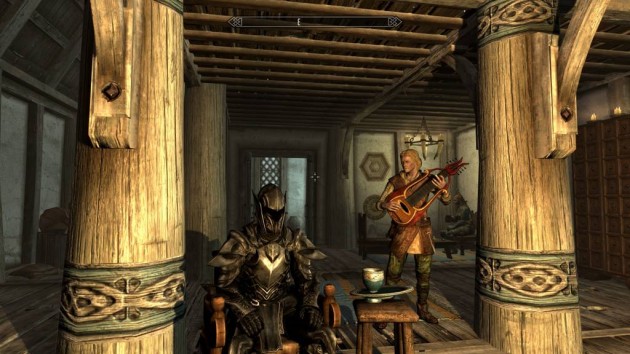
Playing this game has raised my expectations for future games. Not because of the storyline—which, honestly, is mediocre—but because of the depth of the backstory. This is another one of those games that I played because it had the weight of history attached to it, and as such, the world was very believable. History is built into the very designs of the world: dungeons have culturally-based designs; ruins filled with useless, everyday items litter the place; there’s gossip about local people and places; it’s a place where you get the feeling that people have lived and died for hundreds, if not thousands, of years. And as someone who loves world development and level design, it’s been fascinating to strip each element down and see how the designers used the palettes, locations, cultures, and pretty much anything else you could think of when designing an object as mundane as a cup. Skyrim has gotten me thinking about what I need to do to make my own works and worlds more believable, engaging, and inspiring.
Fable series – Jillian Dingwall
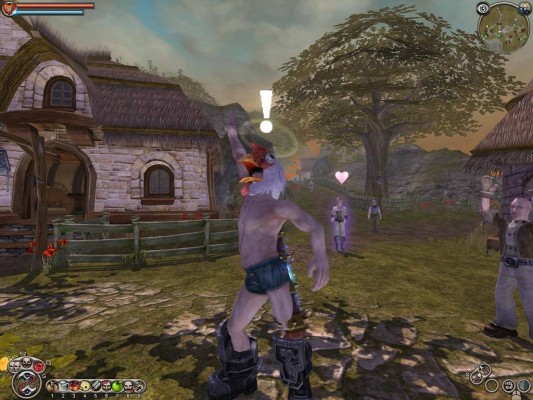
It’s a well-known fact that I am an unashamed fan of the Fable franchise. I say “unashamed” because there are a hell of a lot of people out there who feel that Fable is pretty shameful. Gaming is a serious business after all—and it has to be if we are willing to sacrifice losing our virginity for it—but what Fable does is provide us with some much-needed comic relief in what, at times, can be an unnecessarily serious hobby. Don’t get me wrong—it’s not that I don’t love blowtorching children or shooting Nazis in the face—it’s just that sometimes it’s nice to break up the misery of war games by farting on a chicken. What I love about the series is that, in an era of Halo and Call of Duty, Peter Molyneux had the balls to challenge the pretentiousness and provide us with a game that is light-hearted, frivolous, self-deprecating, hilariously immature and often beautiful. It helped prove to other developers that most of us won’t think any less of your game if it is a bit funny and stupid because sometimes, on those hungover Sunday mornings, we just can’t be assed spending four hours organising a weapons itinerary.
Fallout (PC) – Mark Freedman

War… War never changes, even after we’ve all destroyed ourselves with nuclear weapons. But games change, and Fallout has greatly blended elements of many genres (RPGs, shooters, gambling), to give you a little bit of everything that hopefully everyone can enjoy. While the modern Fallout titles do have bugs, their amazing stories and characters are often in the back of my mind. I’ve never experienced this lasting impression from a game before.
Fallout 2 (PC) – Michael Ridgaway
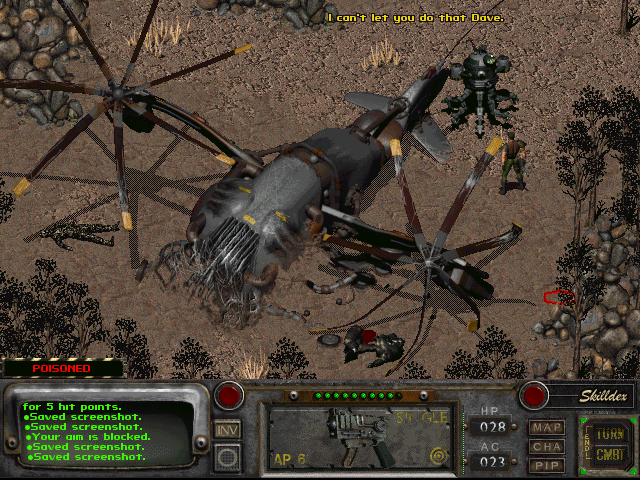
Fallout 2 was the first game I played on the PC, and it blew my mind. It had cursing, sex, guns, and gore—all things I had barely seen in my console games. More importantly, though, it was the first open-ended game I ever played, one where you could just wander around, meet people, and choose any number of ways to react to them. And the characters and story were interesting! A post-apocalyptic future based on 1950s America filled with well-scripted and/or well-voiced characters? Holy crap! I had never played a game that exhibited all these qualities before, and it blew my teenage mind. It greatly elevated my idea of what games could do and be, and raised the bar higher for everything else.
Fallout 3 (X360) – Daniel Castro
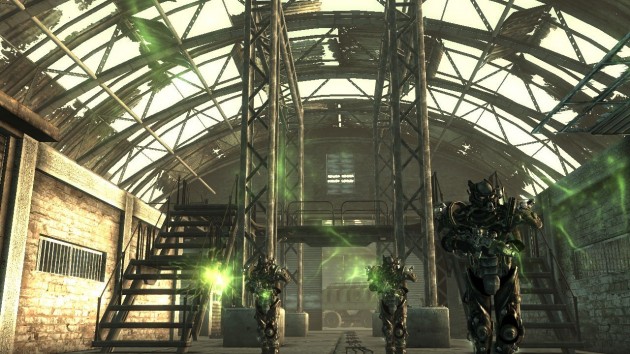
This is one of those games I kept hearing about around the ‘net for quite some time, and almost four years later I finally succumbed to this “vibe” that kept telling me that I needed to play it. I mean, I don’t know if this is one of those must-play games, but its influence has survived way after its release date.
Now that I’ve played Fallout 3, I finally understand what the fuss is all about. I got captivated by the whole post-apocalyptic Washington DC setting and its art-deco architecture. There are way too many things to do and places to explore, so I found myself lost in this Capitol Wasteland for weeks.
I didn’t mind that this game doesn’t have multiplayer or scoreboards; I didn’t even pay attention to its Achievements. I just wanted to live this experience on my own. Also, the opportunity to ask characters “What’s in it for me if I do that stupid chore for you?” is a nice addition to the kind of hero I’m playing in this kind of scenario.
Faxanadu (NES) – Jeff Day
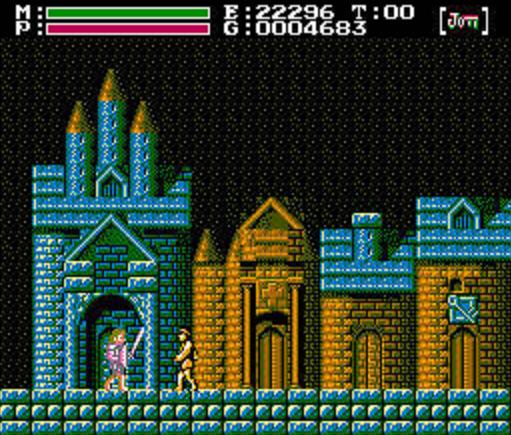
1988 was a pinnacle year for the action-RPG genre. Why, you ask? Because Faxanadu slapped you in the face, that’s why! Faxanadu has never exactly been the most popular title in gaming history, but it most assuredly possessed everything that future generations of action-RPG games could learn from: experience points from real-time battle (though having less of a firm use in Faxanadu), traveling through epic worlds of earthy backdrops, and having gritty remarks from unsuspecting townsfolk. The gameplay was solid, and the graphics and soundtrack were unlike anything you’re likely to ever see again, sadly, though it promoted a more dark environment than most chipper NES platformers. I thank Nintendo for releasing this hidden gem overseas; the influence of the title helped shape my affinity for games and, hopefully, the entire genre’s yearning for greatness.
Final Fantasy series – Kate Jay
As a brand that’s existed for 25 years, Final Fantasy has inevitably affected the gaming world. I haven’t played all of them, and had to give up on a few, but the series still sticks out as a building block of my gaming experience. I’ve always loved how each installment is its own new world to explore and, ultimately, save. (Even when you accidentally make things worse. [see: FFXII, FFVII:Crisis Core, FFX]). Every game has something notable about it, whether it be gameplay, story, art, or overall ambiance. My favorites of the series have got to be XII, Crisis Core, X, and III (VI) (and there’s something satisfying about Dissidia, too; probably the fact that you can beat up Tidus). I love XII for its dark, richly developed world of politics and magic; the characters you play are ultimately pawns who bring about worldwide social change and destroy the lifeforce that fuels magic. Crisis Core is a fabulous study of how it can be fun to play through a story that is ultimately a tragedy; you play it, hoping against hope that you can change the ending this time around. X (and X-2) have a special place in my heart because they were just plain fun. Yes. Even X-2. And III—well, III is a classic in its own right. Fantastic story, music, characters, gameplay…pretty much what got me into the series in the first place. So, while people argue about which title is the best and why, I think we can all agree that the series as a whole has made the gaming world a better place.
Same series, different take – Mark Freedman
For me, the Final Fantasy series is like that person you dated but had no idea why. She was probably your first girlfriend…you’d heard how great it is to have one, maybe seen your friend with one, so you got one for yourself. You spent many hours cultivating that relationship, getting useless trinkets for her, riding big dumb yellow horses called “chocobos” and grinding all the time. Then, you look back and realize how pointless and shallow it all was. I guess everything has a silver lining, though, since it led you to bigger and better things. Of course, on the way to these bigger and better things, you found yourself finding the same girlfriend archetype along the way. She had a different name and appearance, but everything played out the same way. This is Final Fantasy…this was the beginning of my mature gaming career.
Of particular note: Final Fantasy: Mystic Quest (SNES) – Michael Ridgaway
Mystic Quest is often considered the red-headed stepchild of the Final Fantasy franchise, but I love this game. It was the first RPG I played that really clicked with me, and it led me to explore other titles such as Final Fantasy IV, Secret of Mana, EarthBound, Chrono Trigger, etc. FF:MQ is a bare-bones RPG with a generic story that isn’t too hard and was just a great stepping stone from which to explore other games (the music was also great). RPGs can seem overwhelming at times, but Mystic Quest was just what I needed to kick-start a lifelong love of the genre.
Also of particular note: Final Fantasy IV (SNES) – Christian Porter
Maybe I’m just a philistine, but I had a hard time getting into RPGs on the NES. I loved the idea of them, but even at the time when they were cutting edge, it just felt like they were a bit rough to me. To this day I still haven’t even played the original Mother, the predecessor to my favorite game, EarthBound, because I find RPGs of that era so hard to get into.
On the SNES, though, something changed. I tried Final Fantasy IV (FFII at the time) and was immediately immersed. The story of Cecil, Kain, Rosa, and all the others I don’t remember because I haven’t played the thing in like 20 years really grabbed me. For me, it felt like the NES RPGs I liked the concepts of were rough drafts, leading up to these finally finished products, starting with FFIV.
Additionally of particular note: Final Fantasy VII (PS1) – Matt Jonas
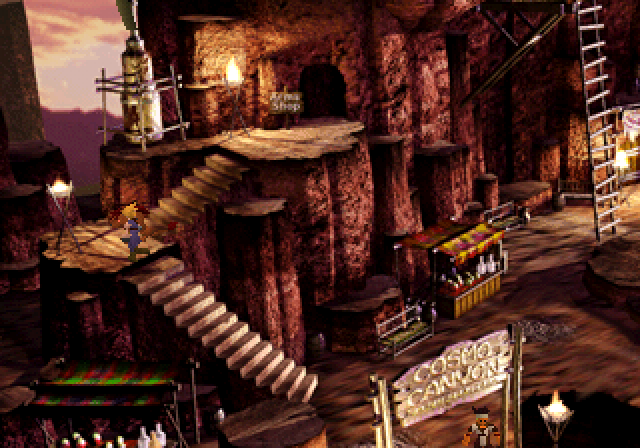
The game that brought you a thousand fanfiction stories chronicling the deep love between Cloud and Sephiroth. The game that brought you hundreds of hours of wonder and amazement.
Final Fantasy VII is a game that, when I played it as a kid, just completely shattered me into a million pieces. In a good way, that is. The first Final Fantasy that I had seriously tried to play, and the first and only Final Fantasy game that I have even beaten.
But that isn’t the only reason why I consider it to be the most special—being the first RPG that I ever slaved over and poured hours and hours into, I can remember so much of the game even now. When I design characters I find myself influenced by the works of Tetsuya Nomura, who did the designs for FFVII. I am influenced by the set design, the pre-rendered backgrounds and the texturing work that must have gone into them. When I look at Final Fantasy VII, I see a game that has yet to be topped by anyone.
Of particularly particular note: Final Fantasy VIII (PC) – Nathaniel Hoover
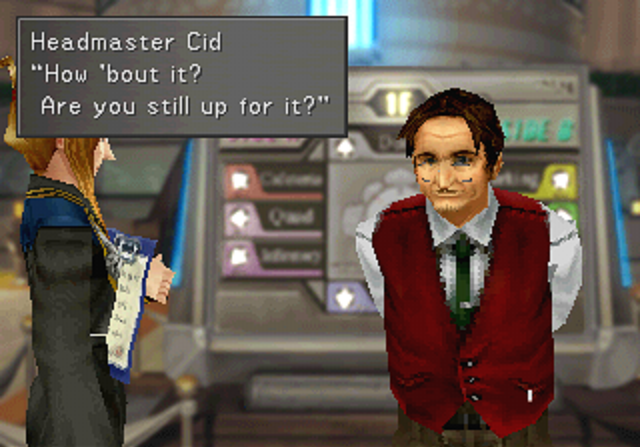
When it becomes apparent that the game you’re only halfway enjoying is becoming TOO LONG, the normal person’s response is to either skip all the fluff and race to the end, or shut off the game altogether and play something—anything—else. When you’re an irrational completionist, however, the only possible response is to bang your head against the wall and suffer through every jot and tittle of optional content the game has to throw at you. When one of the rarest and most unpleasant random encounters in the game—an overgrown plant who immediately belches disease on your party, infecting everyone with confusion, poison, petrification, tonsilitis, etc.—has a tiny percentage chance of dropping the one item you can’t find anywhere else, another option presents itself: cry as you bang your head against the wall.
After I went bug-eyed from so many hours spent grinding for special items such as this one—and finding that the enemies were getting stronger and more difficult to kill as I did so—I took stock of how far away from total completion I really was: optional bosses left unfought, plenty more items to collect, sidequests left hanging…and I’d done everything in my power to avoid learning how to play Triple Tri-Corner Hat, or whatever the heck that card game was called. I’d already spent twice as long on the game as was enjoyable, and I’d have at least twice that much yet to go before having truly completed everything. Making a command decision that would ultimately save videogames forever, I swallowed hard and made a beeline for the final boss, Backloggery be darned.
From that moment on, I’ve given any optional content in a game only as much time as it deserves. I’ll stick with it for as long as it’s fun, but I’ll drop it like a cell phone call in central Idaho the moment it becomes tediously unfulfilling…unless I’m reeaally close to 100% completion. It’s the only way I can play those Elder Scrolls games without spending so long on them that I, myself, become an Elder Scroll, and I have FFVIII to thank for it.
I’m pretty sure I’ve run out of ways to say, “of particular note”: Final Fantasy XI (PS2) – Alex Jedraszczak
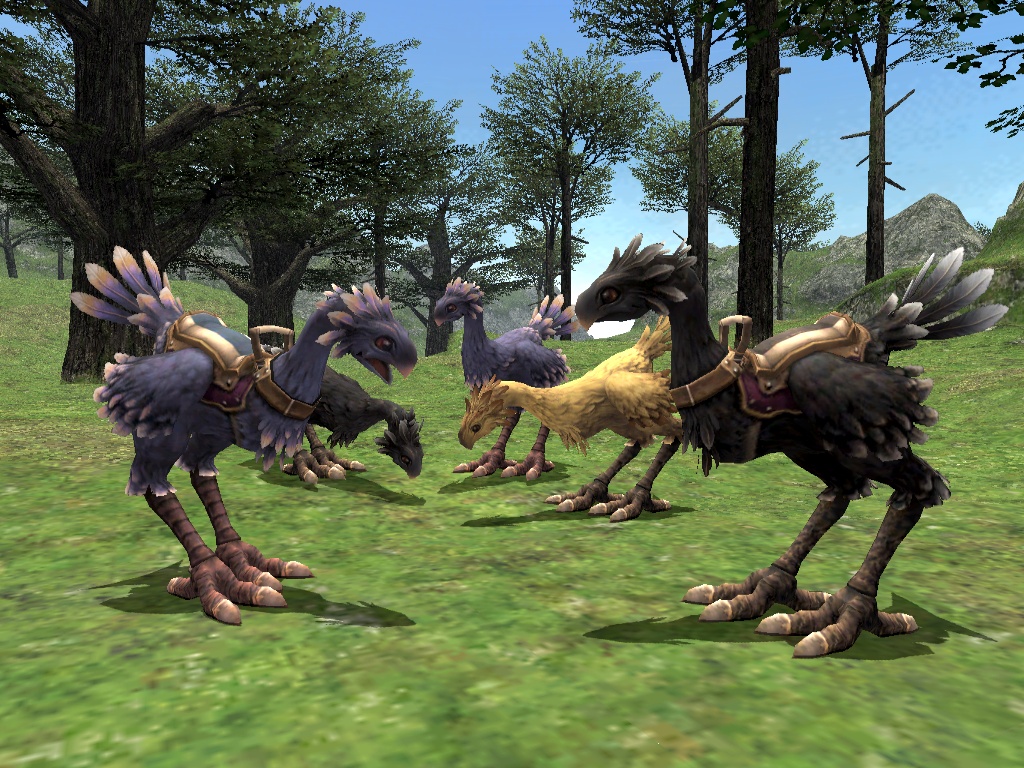
Throughout high school and college, I wasted a decent amount of time playing MMORPGs. As an aspiring game programmer, I always kept a keen eye on the development aspects—difficulty, leveling speed, inventory maintenance, &c. Despite the ridiculous amount of time required to actually be successful at most of these games, they were incredibly addictive and I had trouble convincing myself to stop playing, especially when my friends needed me in their party!
Final Fantasy XI was the game that made me stop playing MMORPGs.
As a huge title from a major company, the game had a different feel to it from the other online games I’d played. When I first started playing, I was blown away. It was solid and well thought out, with a battle system that required a surprising level of skill and cooperation compared to its competitors. The graphics, while not the high-def experience found in other PC games at the time, were definitely better than other contemporary MMOs. For months, when I wasn’t at work or school, I spent all my time playing FFXI.
I began to realize, however, that the gameplay was incredibly formulaic. While there was planning and timing and teamwork involved, every battle was the same once you found your groove. Every battle was the same, just with different graphics. Every place you’d go was just a reason to fight more battles, to gain more levels, to get more items, to go to a different place to do it all again. The reward curve stretched out longer and longer the higher up you got until the game was all you could live for.
While I couldn’t exactly call the game “flawless”, it was the best MMO I had played at the time. Granted that I haven’t played any since, but that’s beside the point. I had been disappointed with the other MMOs that I played for their gameplay or their graphics or their story. I was impressed by FFXI, only to realize in the end that the game was still entirely pointless. It marked a major change in my views on MMOs, and videogames in general.
Fire Emblem Gaiden (FDS) – Michael Gray
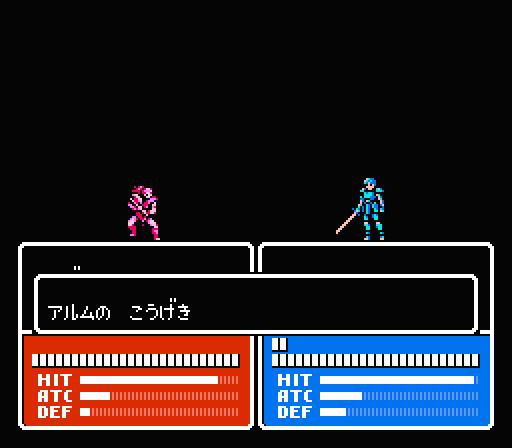
Fire Emblem Gaiden is the game that convinced me RPGs are worth playing. The English translation for the game is probably still unfinished, but that didn’t prevent me from playing the game about five times in a row. I wrote no fewer than three GameFAQs guides for this game, and my enthusiasm for the Fire Emblem series remains unabated, unlike Nintendo’s desire to release the games outside of Japan.
Front Mission series – Alex Jedraszczak
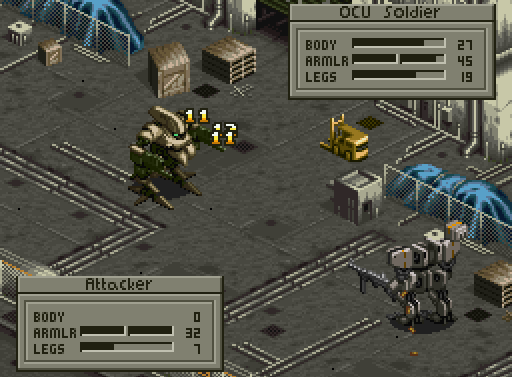
Tactical games have always had flaws. The battle system always has some sort of problem, whether it be how turn order is determined, or how many actions you can execute per round, or how the enemies are always cheating losers who seriously what even just happened the computer is totally ripping me off and I’m ejecting this cartridge straight into the trash.
…But, anyway. No tactical game is perfect, but Front Mission has always sought progress. As an aspiring game developer, I can appreciate this. Each game has better balance than the last, and they actually manage to make tactical games fast and fun. Fast and fun—in my tactical game?! But it’s supposed to be about waiting for everyone to do their thing, then finally getting to the one character you care about and having their big move miss! Isn’t it?!
In the first few games, they sorted out balance issues with how much money you made and how powerful your robots could be. In more recent installments, they’ve worked on how to spell “Tactical” without the letters “B-O-R-E”. Characters that are nearby the active character can help out if they have leftover action points, even though it’s not their turn. It leads to different tactics and faster gameplay, which is good to keep the genre new and interesting. Each game gave me a new look at how tactical games could be played.
Plus, there are giant robots, which is a favorite trope of mine. All in all, a series worth playing.
GoldenEye 007 (N64) – Christian Porter
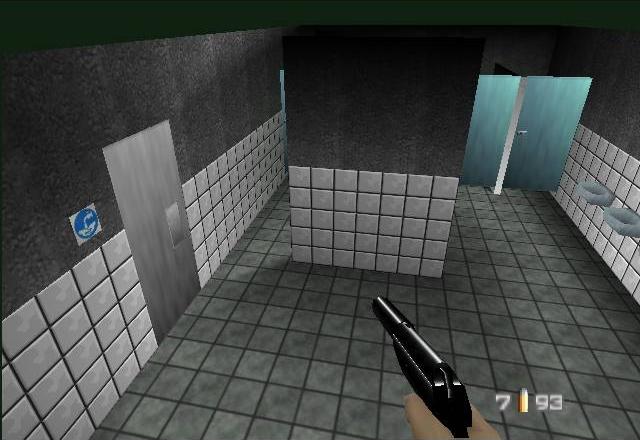
If there’s two things I like, it’s videogames and being a bastard to my friends. GoldenEye finally combined these two things. It opened my eyes to how incredibly fun it can be to shoot your friends square in the face and reinvented multiplayer for me. It went from maybe an hour or two of Bomberman to damn near entire days playing GoldenEye with friends. When we were at home we’d play on our own, trying to get better, exploring and memorizing the levels (even though we were just going to play Facility over and over), and mastering all weapons, from golden guns to slappers.
How to be a bastard in GoldenEye:
- Always be Oddjob.
- Always move while kneeling, so you have a smaller hitbox and you kind of just look weird hovering around like a creep.
- Proximity mines on every possible starting point.
- Hide in the vents.
- Next time someone kills someone else, you win.
Gradius II: Gofer no Yabou (VC) – Nathaniel Hoover
The long version of this story involves a chance collision of sudden nostalgia for the original Gradius, accidentally discovering the awesome Gradius II soundtrack on YouTube, latent curiosity about Gradius II and III, a surplus of Wii Points, and the reader dying of boredom. The short version jumps straight to the part where I spent about $80 over the course of two weeks buying up every Gradius sequel and spinoff available for every system I owned, even eyeing the used PSPs at GameStop so I could break my vow of fealty to Nintendo and play a half-dozen other Gradius sequels and spinoffs, too.
Gradius II took every expectation I had from Gradius and the derivative Game Boy spinoff Nemesis and completely blew them out of the water. I mean, space. Space water. Virtually every aspect of this space shooter series was improved and expanded upon in Gradius II, and I found myself not only enjoying the game but constantly laughing at how creatively ridiculous the challenges and rewards were. Even when the magic began to fade as the stages became too long and the difficulty too strenuous for a platform gamer such as myself to handle, I was still in awe of how well the game balanced nostalgia for the original game with refreshingly fresh ideas. I wanted more, and I had wanted more since I was a little kid…but I’d never owned the right systems, or seen any of the other games for sale at a store or convention, or looked hard enough online to find anything that wasn’t outrageously expensive despite having a hole in the center or being covered in a curiously strong white powder (which is what I assume they mean by “mint-condition”).
The Wii Virtual Console, WiiWare, and Amazon.com’s low prices on portable games (listen to me; I sound like an advertisement) removed all those barriers. Two decades of Gradius were suddenly at my fingertips, and I had every intention of getting caught up on one of my new favorite series as quickly as possible. Gradius II got me hooked on a series in a way I haven’t been hooked since…well, since Mega Man, and we know what happened with that one. Also, the availability of this game that I’d never seen, for this system I’d never heard of, and its incredibly reasonable price point, presented me with the first truly compelling reasons I’d ever had to download a game that could be purchased in hardcopy and put proudly on display with the rest of my collection, safe from the insidious clutches of bored teenage hackers.
Guitar Hero series – Daniel Castro
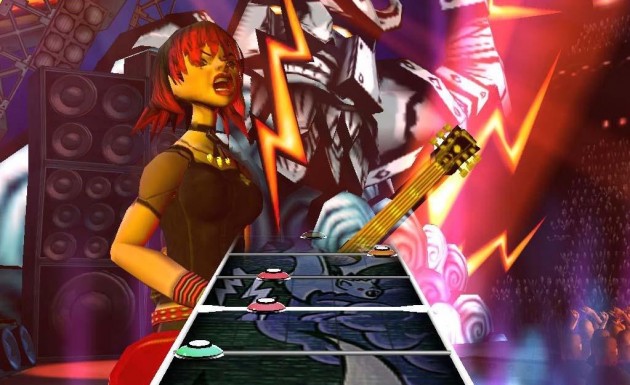
Talking about games that became an obsession, the Guitar Hero series stole a good chunk of my gaming time and money. I got invited by a friend to play the first one at his house; at first, I had real issues about being watched playing with a toy guitar, but I changed my mind after watching my friends having so much fun with it, and after a round playing “Smoke on the Water”, I knew I needed this game in my house.
Guitar Hero II & III became part of my collection as soon as they were released, and I vigorously punished my hands trying to get perfect scores in most of the songs. Another thing that I liked about having these games in my library was their appeal and how easy it was to “convert” people into gaming, since they gave people the chance of enjoying some of the best songs of all time in a way they’d never experienced.
Sadly, Activision did an excellent job at pummeling this series into the ground by releasing way more games than its fans would be interested in buying. Two games of the series every year proved to overestimate the appeal of the franchise, finally taking Guitar Hero out of the spotlight for financial reasons.
More importantly, they were running low of available great tracks for every new release of the game, and that must’ve discouraged many followers of the series (myself included). No, Activision…Tokio Hotel is not welcome in this house of rock.
Halo: Combat Evolved (Xbox) – Daniel Castro
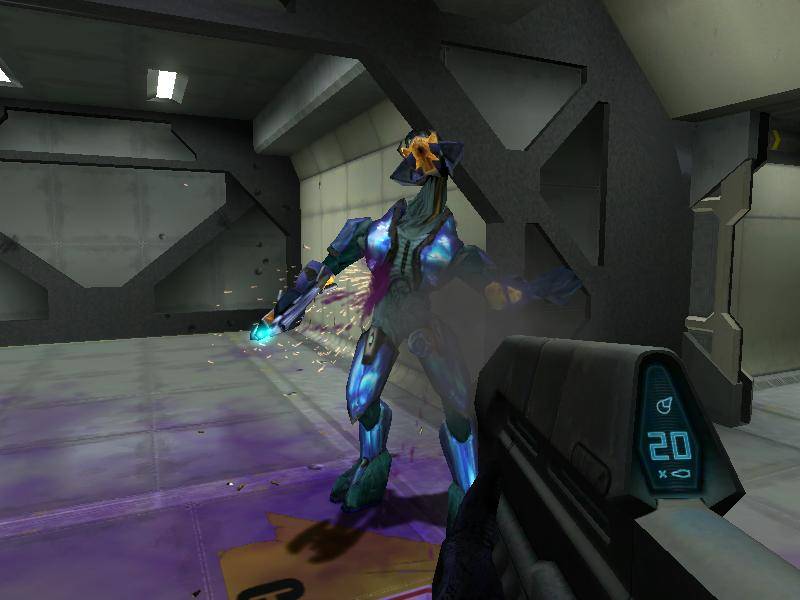
Back in 2001, I was a raging Nintendo fanboy who couldn’t give a second toss at anything being released on any N-less console on the market. All that changed that same year, and mostly because of the first entry in the Halo series.
By the end of the Nintendo 64 era, I ended up astray in the sea of “not having enough money to get myself a GameCube” while I tried to keep myself up-to-date with the newest releases.
The newest Mario looked just OK, and the next Zelda was still far from being a reality, so it was just a matter a time before the Xbox’s exclusive juggernaut found its way to me—and since I’ve always been very fond of action games, Halo: Combat Evolved simply broke my stubbornness and opened my mind to trying something different for good measure.
Chances are I don’t need to tell you about Halo at all, and you might already love it or hate it by now; I don’t mind. I know the series hasn’t received any ground-breaking changes in the last decade, and I know I’m not even buying Halo 4 this year. But still, I can’t deny the first game of the series for being the one that made me set foot on foreign lands and set my sights on newer and unknown species of gaming.
Heroes of Might and Magic III (PC) – Nathaniel Hoover
While I could pull executive privilege here and list off Worms Armageddon, Civilization III, Super Smash Bros. Melee, SimCity 2000, Jedi Knight II, Master of Orion II, Super Mario World, and a half-dozen others, I’m electing Heroes III to be the lone representative of the games that fostered my love of custom mapmaking and/or characterized my wild Saturday nights in high school and college. (We duct-taped somebody to a wall. Don’t tell me my Saturdays weren’t wild.) What makes Heroes III uniquely qualified for this distinguished position is that its appeal as both a solo and a social game has endured longer and more strongly than Crystal Pepsi any other game I own.
I’ve been building kingdoms, rallying armies, and bedecking my heroes with goofy-looking magical hats at least once a year since the game came out, if not once a week. I’ve teamed up with my sister to wipe the scourge of Player Pink from the world; I’ve trudged through swamps to beat my best friend from elementary school to the Holy Grail; I’ve waged a (completely unrelated to washing dishes) war of attrition with my college roommate; and I’ve mercilessly swooped in to steal every one of my wife’s cities the moment they became momentarily undefended. I’ve also slept on the couch. Even when it’s been just me in front of the computer, entire afternoons have disappeared to the crafting of custom maps, with only my growling belly to pull me out of my worldcrafting revelry and remind me that lunch should have happened three hours ago. Heroes III has been an essential part of my gaming career for as long as I’ve owned it, and it’s a fine representative of many equally essential games.
Jet Set Radio Future (Xbox) – Jillian Dingwall
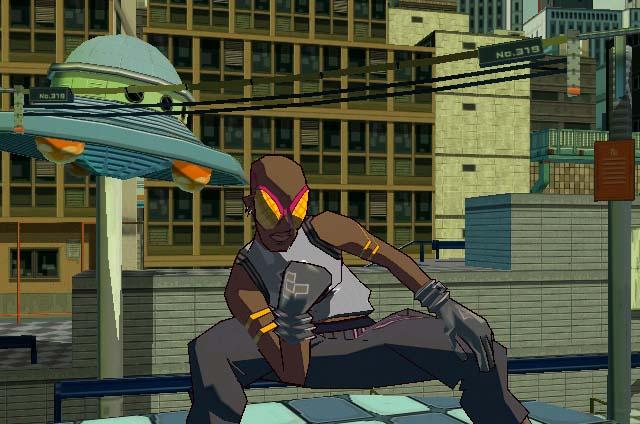
I wanted to put Jet Set Radio Future on this list for one main reason: It is the first game I remember playing in which the soundtrack blew me away almost as much as the game did, adding a whole new dimension to my gaming experience. Before JSRF came along, I never paid attention to much else outside of gameplay, especially when music in gaming always seemed like it was more of an afterthought with predictable switches between up-tempo jingles and slow, dark, boss-killing xylophone crap. The music in JSRF, however, brought a new level of cool to gaming that I never thought possible. I used to play it even when I couldn’t be bothered playing just so I could sing along with this crazy Japanese lady:
Yes, I’m cooking for my son and his wife,
It’s his thirtieth birthday,
Pour berries into my bowl,
Add milk of two months ago,
“It’s mouldy mom, isn’t it?”
I don’t give a flying fuck though,
Shut up and eat!
I mean come on! This shit is awesome!
Karnov (NES) – Jeff Day
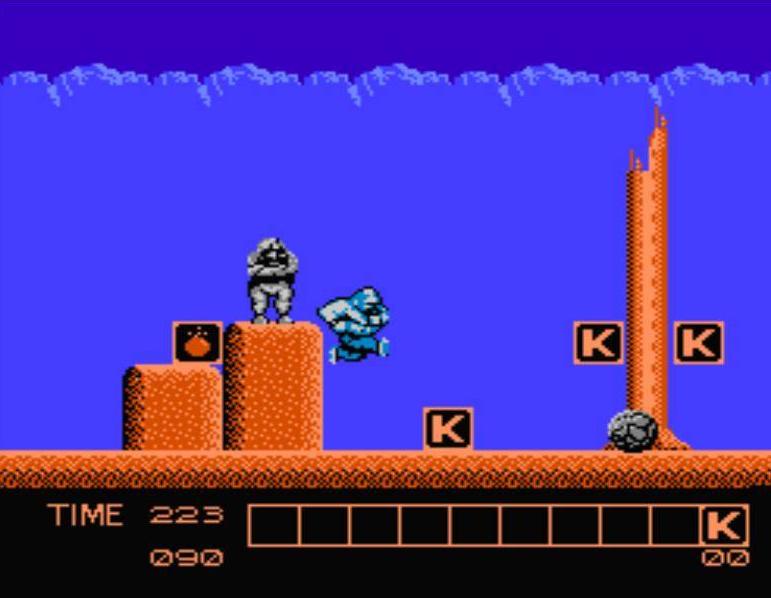
Karnov is messed up. Enemies will randomly appear in various stages, but you’ll never see them re-appear in a second playthrough. The only way to select items is to tap left and right to scroll between available items…WHILE you’re still moving Karnov. Your main character turns BLUE when he gets hurt. Disco ball snakes occasionally rain from the sky. Dinosaurs, erotic fish men, and Biblical figures with pet lions want you dead. This is Karnov in a nutshell. Data East influenced the world in their own way: by teaching competing developers how NOT to program a game. And yet…I still have a soft spot for my beloved Jinborov Karnovski. He’s a great man, and the only Russian I know who can breathe fire…I think.
Katamari Damacy (PS2) – Jeff Day
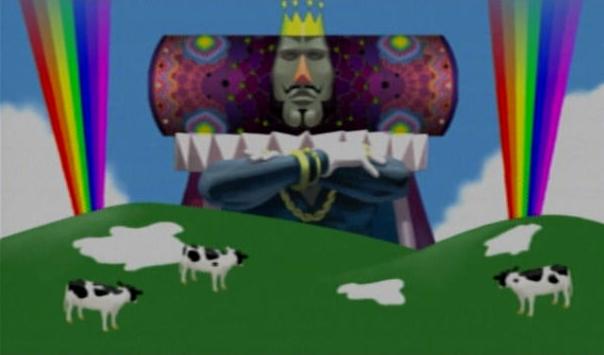
In a world where videogame formulae were growing stale…
In a world where fighting in World War territories and collecting two thousand mystery doodads was the norm…
In a world where Gran Turismo was more than the name of the tapestry vendor in a Turkish bazaar…
There was…Katamari Damacy. Singlehandedly spearheading the videogame industry with an idea that was explosively unique in its control scheme, its overall concept of rolling up the world with a sticky ball, and its jovial comedic timing courtesy of a man with an obvious affinity for showing off his own junk, this game kicked the anuses of all opposition, creatively speaking. Move over, Jak & Daxter: there’s a new King of Picking Up Useless Objects in town.
King’s Quest VI (PC) – Jeff Day
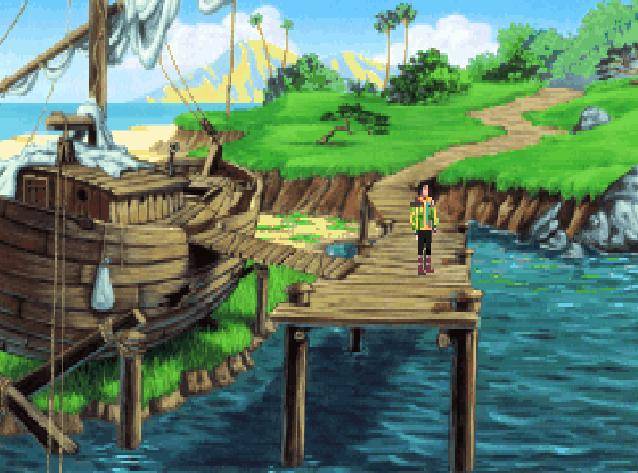
The King’s Quest series is pretty much a staple of adventure gaming on the PC, and this series is what introduced me to the genre. In terms of user-friendliness, storytelling, and overall creativity of puzzles, King’s Quest VI: To Heir Is Human was the best of the bunch. (I’m sorry, Mask of Eternity. You’ll get your day in the sun.) King’s Quest VI is the direct sequel to King’s Quest V and follows the travels of Prince Alexander of Daventry as he visits the Land of the Green Isles in search of love, though he ends up finding much more trouble afoot than expected. This game teased the brain immensely, requiring the player to not only think in a non-straightforward manner, but also to use external resources, such as an enclosed booklet as written by a supposed explorer and expert of the Green Isles, as a means of solving puzzles, thus providing a direct connection between the game and the player. Combined with the already top-notch new point-and-click functionality, King’s Quest VI was a rich experience that other games in the future could, should, and would use as a template for excellence.
… Not to mention there’s a grumpy talking tomato. How’s that?
IS IT OVER YET?
Why, hello there, ominous disembodied voice from our “Gamera Obscura” column. What brings you here?
THAT JEFF DAY CHARACTER HOGGED THE SPOTLIGHT FOR THREE GAMES IN A ROW, AND I SPONTANEOUSLY APPEAR WHEN HE WRITES THAT MUCH. IT’S SORT OF A BEETLEJUICE THING.
Ah, I see. Say…since you’re here, could I possibly persuade you to write a blurb for the next section of this list?
NO. YES. MAYBE. HAS ANYONE CALLED KICKLE CUBICLE?
Well, no, but we’re already—
BECAUSE I THINK KICKLE CUBICLE IS FUN TO SAY.
… Of course it is, Ominous Voice. But, um, we’re already done with that part of the alphabet, and—
KICKLE CUBICLE.
Right. Great. We’ll be back next time with—
KIIIIICKLE CUUU—
OK, I’m cutting you off now.

KICKLE FRICKLE CUBIFRICKLE!!!
Don’t be that Guy: Christian Porter.
Oh, you’ll see, I’m going to get way more “Don’t Be That Guy” once we get to “S”.
Oh no!
Just when I was about to type a relevant response…
…Wiley ran off with Gamma!
Dun dun DUUNNNN!!!
(Even when it’s a month late, dramatic music is still dramatic.)